|
|
|
Sort Order |
|
|
|
Items / Page
|
|
|
|
|
|
|
| Srl | Item |
| 1 |
ID:
131424
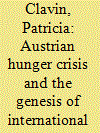

|
|
|
|
|
| Publication |
2014.
|
| Summary/Abstract |
From its foundation in 1918, the new Austrian republic was gripped by famine and a crisis of confidence in its currency that threatened to tip the new state into hyperinflation and revolution. This article shows how western efforts to aid Austria combat famine and its financial crisis were linked, and how they had a profound impact on the new League of Nations, the world's first multi-purpose intergovernmental organization. It also demonstrates the importance of the incipient wartime international bureaucracy for League agency. Contrary to the expectations of its architects, member governments, international financiers, businessmen and economists began to see the League as a useful tool to meet common needs that today would be called the search for human security. The article demonstrates how the Austrian food and financial crisis was the founding moment in the institutionalization of international economic and financial coordination, cooperation and oversight. It established the Economic and Financial Organization of the League of Nations, whose work would later inform its successors, the International Monetary Fund, the World Bank and the European Union. The study speaks to the ways in which the notion of security has broadened in the past two decades to embrace economic, social, political and environmental concerns. But the notion of 'human security' is not new; it was written into the body of the League.
|
|
|
|
|
|
|
|
|
|
|
|
|
|
|
|
| 2 |
ID:
153138
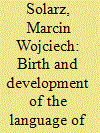

|
|
|
|
|
| Summary/Abstract |
The 1940s saw an intensification of worldwide interest in the problems of development and underdevelopment. One consequence of this was a rapid evolution of the language of global development. The reconstruction of its genesis is most commonly attempted through the analysis of literature on the subject and accounts by those who took part in or observed the debates of the time concerning the world’s development and structure. This article proposes a different approach which locates important events in the evolution of the modern language of global development on timelines tracing populational, political, socio-economic and civilisational processes.
|
|
|
|
|
|
|
|
|
|
|
|
|
|
|
|
| 3 |
ID:
144431
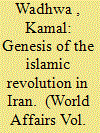

|
|
|
|
|
| Summary/Abstract |
Kamal Wadhwa depicts Iran as a nation conflicted between its Indo-European, monarchical and rather sybaritic culture and a more austere Islamic heritage. Although the Shah’s rapid and often ruthless modernising pro-Western reforms sowed widespread domestic discontent that led to his fall, the results of his efforts at economic and social development are now pushing Iran away from the current theocracy.
|
|
|
|
|
|
|
|
|
|
|
|
|
|
|
|
| 4 |
ID:
082464
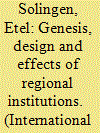

|
|
|
|
|
| Publication |
2008.
|
| Summary/Abstract |
Why do regional institutions emerge, what accounts for their variation in design, and what are their effects? Several conceptual and epistemological perspectives-neorealism, neoliberal-institutionalism, constructivism, and domestic politics-provide competing and complementary answers to these questions. I focus on regional organizations as productive arenas for developing contingent propositions on institutions more generally. The purpose is to advance cross-paradigmatic dialogue in two ways: through sensitivity to scope conditions and to institutional genesis, forms, and effects, in an effort to transcend axiomatic debates that often conflate different dependent variables. The empirical analysis includes the Association of Southeast Asian Nations (ASEAN), Asia-Pacific Economic Cooperation (APEC), ASEAN Regional Forum (ARF) and the Arab League. The main findings from these cases suggest that understanding the nature of dominant domestic coalitions is often crucial for explaining incentives to create, design, and fine-tune the effects of institutions. However, this is mainly the case when the consequences of creating or designing institutions for power distribution, transaction costs, and norms are negligible or hard to estimate. In many cases these consequences are sizeable, reducing the explanatory influence of domestic coalitions. The latter often provide no more than permissive conditions for the emergence, design, and effect of institutions. Their influence is most decisive in explaining institutional genesis but is often underdetermining in explaining their design
|
|
|
|
|
|
|
|
|
|
|
|
|
|
|
|
| 5 |
ID:
146956
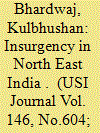

|
|
|
| 6 |
ID:
139587
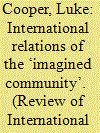

|
|
|
|
|
| Summary/Abstract |
Benedict Anderson's Imagined Communities has long been established as one of the major contributions to theories of nations and nationalism. Anderson located the rise of national identities within a long-evolving crisis of dynastic conceptions of identity, time, and space, and argued print-capitalism was the key cultural and economic force in the genesis of nations. This article offers a critical appropriation and application of Anderson's theory through two steps. Firstly, it evaluates the conceptual underpinning of his approach through an engagement with recent scholarship on the ‘theory of uneven and combined development’. The fruits of this interchange provide a deeper analytical framework to account for what Anderson calls the ‘modularity’ of national identity, that is, its universal spread across the globe. Modularity is now reconceptualised as a product of combined development with its causal efficacy derived from the latent dynamics of a geopolitically fragmented world. The latter gave shape and form to the new national communities. Secondly, this revised framework is applied to the emergence of Chinese national identity in the late nineteenth century. This allows Chinese nationalism to be recast as an ideological amalgam of indigenous and imported elements that emerged out of the crisis-ridden encounter between Imperial China and Western imperialism in the nineteenth century.
|
|
|
|
|
|
|
|
|
|
|
|
|
|
|
|
|
|
|
|
|